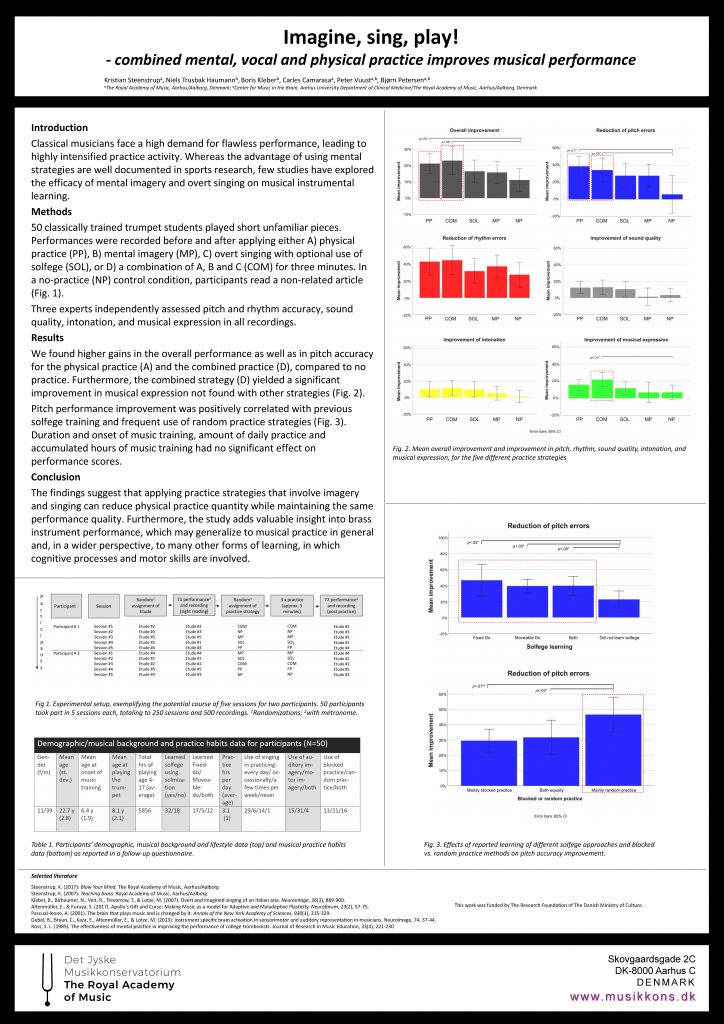Imagine, Sing, Play-
Combined Mental, Vocal and Physical Practice Improves Musical Performance
Forskningsprojekt ved Professor Kristian Steenstrup
Kristian Steenstrup har sammen med kolleger fra DJM og Center for Music in the Brain fået udgivet en artikel i det anerkendte tidsskrift Frontiers of Psychology, Performance Science. Artiklen beskriver resultaterne af Steenstrups omfattende forskningsprojekt om mental øvning, som han har gennemført med støtte fra DJM og Kulturministeriets forskningsfond.
Projektet undersøgte systematisk virkningen af tre specifikke øvestrategier: auditiv/motorisk visualisering, sang m/u solmisation, fysisk øvning samt en kombination af de tre på kvaliteten og effektiviteten af trompetstuderendes tilegnelse af et ukendt stykke musik. 50 trompetstuderende fra Europæiske lande har deltaget i undersøgelsen og har involveret tre eksperter, som uafhængigt af hinanden og i tilfældig rækkefølge har bedømt præstationerne på i alt 500 lydoptagelser. Hovedkonklusionen er at anvendelse af en kombination af sang, visualisering og fysisk øvning giver et lige så godt resultat i forhold til at gengive tonerne i musikken samt at den samme kombination resulterer i et markant bedre musikalsk udtryk end alle de øvrige strategier.
Artiklen er åben for alle og kan læses her.
Abstract:
Classical musicians face a high demand for flawless and expressive performance, leading to highly intensified practice activity. Whereas the advantage of using mental strategies is well documented in sports research, few studies have explored the efficacy of mental imagery and overt singing on musical instrumental learning. In this study, 50 classically trained trumpet students performed short unfamiliar pieces. Performances were recorded before and after applying four prescribed practice strategies which were (1) physical practice, (2) mental imagery, (3) overt singing with optional use of solfege, (4) a combination of 1, 2 and 3 or a control condition, no practice. Three experts independently assessed pitch and rhythm accuracy, sound quality, intonation, and musical expression in all recordings. We found higher gains in the overall performance, as well as in pitch accuracy for the physical practice, and the combined practice strategies, compared to no practice. Furthermore, only the combined strategy yielded a significant improvement in musical expression. Pitch performance improvement was positively correlated with previous solfege training and frequent use of random practice strategies. The findings highlight benefits from applying practice strategies that complement physical practice in music instrument practice in short term early stages of learning a new piece. The study may generalize to other forms of learning, involving cognitive processes and motor skills.
Fofattere: Kristian Steenstrup1, Niels Trusbak Haumann2, Boris Kleber2, Carles Camarasa1, Peter Vuust1,2 and Bjørn Petersen1,2
1 The Royal Academy of Music, Aarhus, Denmark, 2 Center for Music in the Brain, Department of Clinical Medicine, Aarhus
University, Aarhus, Denmark
Se også Steenstrups poster som blev præsenteret ved konferencen The Neuroscience and Music VII i Aarhus, juni 2021

